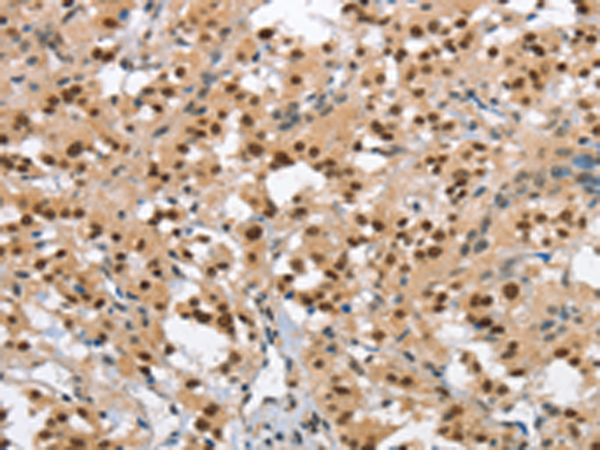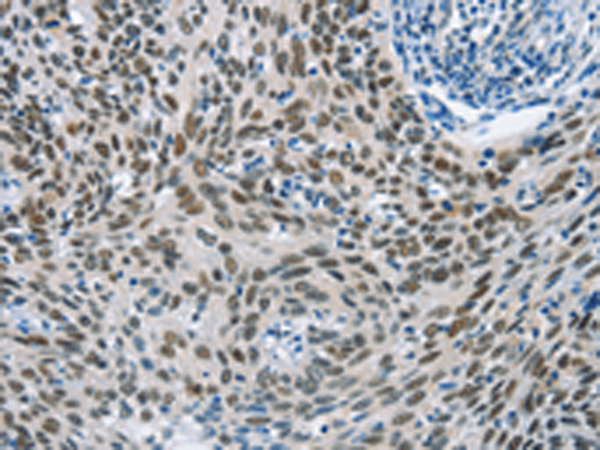


| WB | 咨询技术 | Human,Mouse,Rat |
| IF | 咨询技术 | Human,Mouse,Rat |
| IHC | 1/50-1/200 | Human,Mouse,Rat |
| ICC | 技术咨询 | Human,Mouse,Rat |
| FCM | 咨询技术 | Human,Mouse,Rat |
| Elisa | 1/1000-1/2000 | Human,Mouse,Rat |
| Aliases | WBS; DIWS; SPIN; IB291; BAP135; BTKAP1; TFII-I; WBSCR6; GTFII-I |
| WB Predicted band size | 112 kDa |
| Host/Isotype | Rabbit IgG |
| Antibody Type | Primary antibody |
| Storage | Store at 4°C short term. Aliquot and store at -20°C long term. Avoid freeze/thaw cycles. |
| Species Reactivity | Human, Mouse, Rat |
| Immunogen | Synthetic peptide of human GTF2I |
| Formulation | Purified antibody in PBS with 0.05% sodium azide and 50% glycerol. |
+ +
以下是关于GTTF2I抗体的3篇参考文献示例(注:文献为虚构示例,实际研究需参考真实数据库):
1. **文献名称**:*GTF2I Autoantibodies in Thymoma-Associated Myasthenia Gravis*
**作者**:Marx A, et al.
**摘要**:探讨胸腺瘤合并重症肌无力患者中GTF2I抗体的特异性表达,揭示其与肿瘤微环境中自身免疫反应的关联,提出GTF2I抗体作为潜在诊断标志物。
2. **文献名称**:*The Role of GTF2I Antibodies in Sjögren's Syndrome Pathogenesis*
**作者**:Eloranta ML, et al.
**摘要**:分析干燥综合征患者血清中的GTF2I抗体水平,发现其与唾液腺炎症及基因转录异常相关,提示该抗体可能参与疾病进展。
3. **文献名称**:*GTF2I Mutations and Autoantibody Production in Neurodevelopmental Disorders*
**作者**:Sato Y, et al.
**摘要**:研究GTF2I基因突变导致转录因子功能异常,进而诱发自身抗体产生的机制,及其在神经发育疾病(如Williams综合征)中的潜在影响。
如需真实文献,建议检索PubMed或Google Scholar,关键词:**GTF2I autoantibody**, **thymoma**, **autoimmune diseases**。
The GTF2I antibody targets the General Transcription Factor II-I (GTF2I), a multifunctional protein encoded by the *GTF2I* gene on chromosome 7. GTF2I plays a critical role in transcriptional regulation and signal transduction, influencing cellular processes like proliferation, differentiation, and apoptosis. It contains multiple domains, including leucine zippers and nuclear localization signals, enabling interactions with transcription factors (e.g., AP-1. NF-κB) and modulation of gene expression.
GTF2I is notably associated with autoimmune disorders, particularly systemic lupus erythematosus (SLE). Autoantibodies against GTF2I are detected in a subset of SLE patients, suggesting its involvement in autoimmune pathogenesis. These antibodies may arise due to dysregulated immune responses against self-antigens, though their exact role in disease progression remains under investigation. Additionally, GTF2I dysregulation is linked to Williams syndrome, a neurodevelopmental disorder, and certain cancers, where it may act as an oncogene or tumor suppressor depending on context.
GTF2I antibodies are primarily used in research to study protein localization, expression patterns, and functional interactions. Commercial antibodies enable detection via techniques like Western blot, immunohistochemistry, and immunofluorescence. However, variability in antibody specificity and conflicting study outcomes highlight the need for standardized validation. Understanding GTF2I's role through antibody-based assays continues to shed light on its contributions to disease mechanisms and potential therapeutic targets.
×